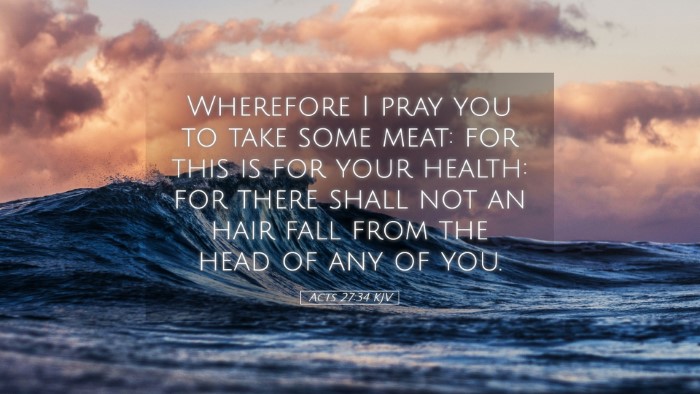Commentary on Acts 27:34
Acts 27:34 states: "Wherefore I pray you to take some meat: for this is for your health: for there shall not an hair fall from the head of any of you." This verse comes from the account of Paul’s voyage to Rome, where he reassures his fellow passengers during a tumultuous storm. The commentary that follows draws insights from notable public domain works to elucidate the meaning and implications of this verse.
Contextual Analysis
The context of this verse is crucial. Paul, a prisoner on his way to be tried in Rome, finds himself amidst a severe tempest. This storm, often referred to in scripture as "Euroclydon" (Acts 27:14), had wreaked havoc on the ship and nearly crushed the spirits of all aboard. At this desperate moment, Paul stands as a beacon of hope, having received a divine assurance.
The Assurance of Safety
Matthew Henry emphasizes Paul’s role as a leader during this crisis. He highlights that Paul, despite his status as a prisoner, shows remarkable courage and authority derived from his faith: "Now, while the rest of the company were at their wits' end, Paul stands up, as one well acquainted with the God of Heaven." Paul reassures them not only of their physical safety but also offers encouragement regarding their spiritual state.
The Importance of Physical Nourishment
Paul’s exhortation to "take some meat" carries significant weight. Albert Barnes notes that the body requires sustenance, particularly in times of stress: "At times of extreme danger, strength is needed to sustain the body and preserve life." This instruction also speaks to the holistic nature of human well-being; both spiritual and physical sustenance are essential.
Nourishment for Body and Soul
Adam Clarke expands on this, describing the duality of nourishment. He states, "This is for your health" suggests a concern not only for their immediate needs but also for their overall vitality. Clarke indicates that this reflects the broader principle of reliance on God for both temporal and eternal sustenance. Paul’s concern is thus not just for their pleasure in eating, but for their health, emphasizing that care for the body can be an act of divine service.
Divine Providence
The latter part of verse 34 assures that "there shall not an hair fall from the head of any of you." This assurance reflects God’s providential oversight which is a frequent theme in scripture. Barnes points out that this promise signifies an extraordinary preservation: "Not only their lives but every aspect of them shall be cared for by divine decree." Such a promise is often reflective of God’s covenant relationship with His people, assuring His protection and care.
Faith amidst Adversity
Paul’s initial exhortation is infused with faith. He is encouraged by the angel of God, which leads him to confidently state God’s promise of safety. Henry remarks, "The boldness of faith appears in Paul; he had both a good cause and a good conscience." This demonstrates how faith can inspire confidence, even in the face of life-threatening situations.
Practical Implications for Believers
For pastors and scholars, the insights from this verse encourage the integration of faith and action in moments of crisis. It reminds leaders of the importance of providing both spiritual and practical resources in dark times. Paul’s actions exemplify a model for pastoral care, attending to both the physical and spiritual needs of the congregation.
Community and Support
This episode underscores the need for community and support during crises. Paul’s leadership emerged as vital, and his role as a comforter reflects the communal aspect of faith. Clarke posits that: "In times of distress, the strength drawn from mutual support is paramount." Pastoral leaders should emulate this by creating a strong community where members can uplift one another, especially during tumultuous seasons.
Developing Resilience Through Faith
Incorporating teachings from this passage could lead congregants towards developing resilience through faith. In moments of uncertainty, looking to God's promises as Paul did becomes essential. Henry echoes this sentiment, asserting that:
"Faith upholds in the storm, assures us of our preservation, and inspires us to face tomorrow with courage."
Conclusion
Acts 27:34 serves as a powerful reminder of God's providential care, the necessity of physical sustenance, and the role of leaders in times of crisis. Combining the insights from Henry, Barnes, and Clarke provides a multidimensional understanding of this scripture, emphasizing both the immediate context and its broader implications for contemporary believers. This passage implores us to rely on divine assurances, nurture each other physically and spiritually, and steward a community where faith thrives amidst adversity.


